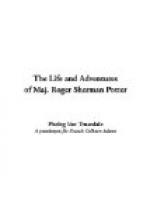But if my father was alarmed lest my morals should suffer by these temptations, my mother would have answered to heaven for my virtue, though a dozen damsels were setting snares for me. And this will be shown in the next chapter.
CHAPTER II.
Which treats of how I left my native Cape, and sundry other matters.
I had no sooner disclosed to my father my musings with Fame, and the aspirations she had excited in me, than he went right into a passion, and set me down as extravagant and mad. He had entertained hopes of making me a schoolmaster, perhaps an inspector of fish, in which office excellent opportunities for increasing one’s fortunes were offered; but I had been rendered quite useless to the parish ever since the New York politicians had taken me into their favor. Anybody, he said, might go out upon and know the world, but few had the courage and daring to grapple with its difficulties. And then, the world was so wicked that men of reflection instinctively shrank from it. Notwithstanding my wild, visionary plans, he yet had hopes of me. But if I sought distinction in the political world, it would be well not to forget that it had at this day become a dangerous quicksand, over which a series of violent storms continually heaved. And these storms, by some mysterious process or other, were incessantly casting up on the shore of political popularity and making heroes of men whose virtues were not weighty enough to keep them at the bottom. “Be an humble citizen, my son,” said he: “learn to value a quiet life. You are not given to loud and boisterous talking, to lying, or to slandering; which things, at this day, are essential to political success. Worthy and well disposed persons are too much afraid of being drowned in the violence of the storm politicians with shallow brains and empty pockets create, by their anxiety to take the affairs of the nation into their own keeping. Remember, too, that if you fail in the object of your ambition (and you are not vagabond




